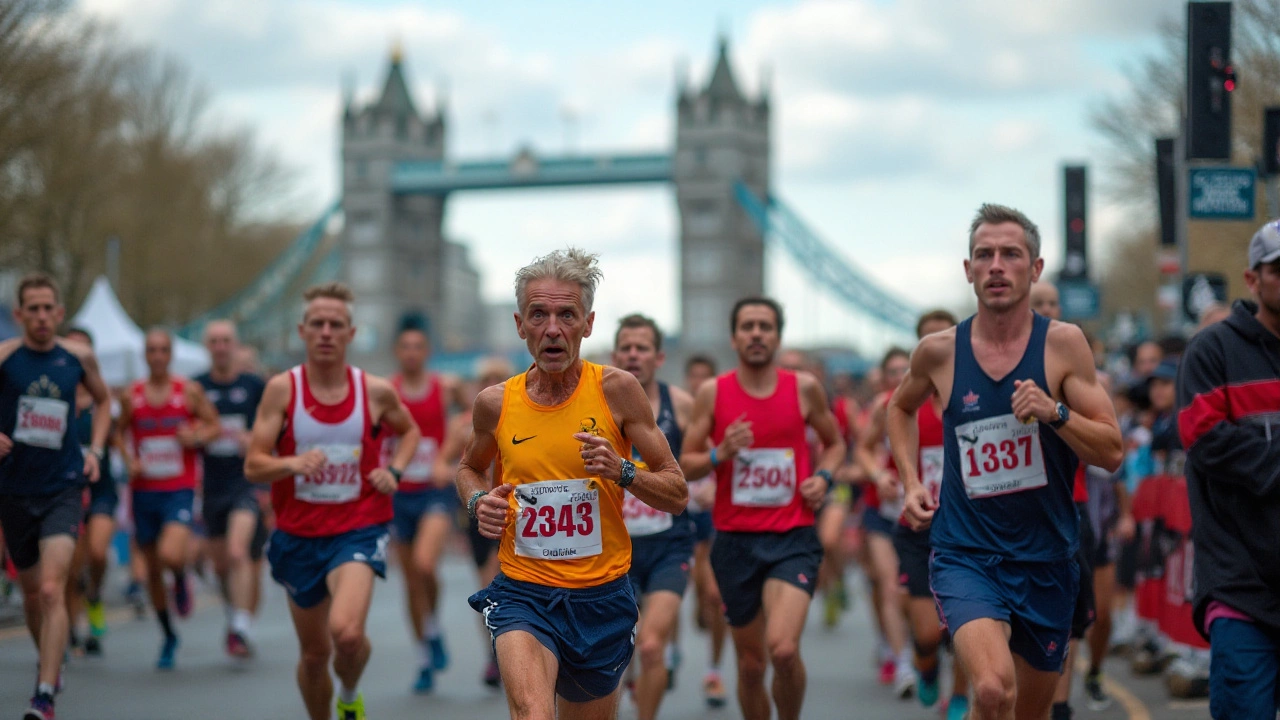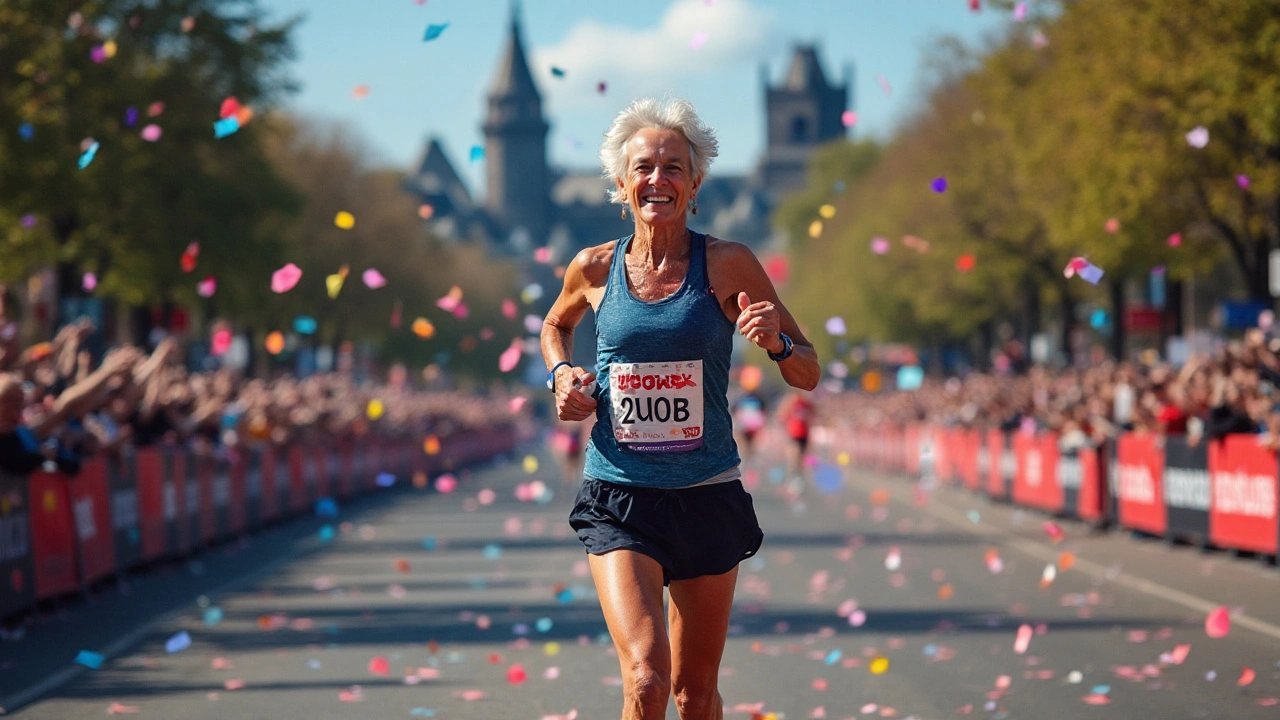Average Marathon Completion Times and Training Tips

Tackling a marathon is a daunting but exhilarating challenge. Before venturing into this quest, many wonder how long it usually takes to cross that coveted finish line. While averages give an outline, it's important to remember that each runner begins their journey differently.
Several elements influence marathon times, from personal fitness levels to external conditions on race day. Understanding these factors can help shape realistic expectations and build a focused training regime.
Whether you're an enthusiastic beginner or a seasoned runner, knowing practical tips and effective strategies can be your best ally in this adventure. By keeping realistic pace goals and learning from celebrated achievements, you can carve your own path to marathon success.
- Understanding Marathon Time Averages
- Factors Affecting Marathon Times
- Training Strategies for Efficient Running
- Tips for Progressing Your Marathon Time
- Inspiration from Notable Marathon Records
Understanding Marathon Time Averages
Marathons have entranced the world since the days of antiquity, inspiring thousands to lace up their running shoes and hit the pavement. When we consider the average times it takes to complete such a formidable distance, the figures can vary widely based on numerous influences. Generally, the median time for finishing a marathon for men sits around four hours and 30 minutes, while women tend to average around four hours and 55 minutes. However, these numbers can fluctuate due to several determining factors, including the runner's age, experience, and the type of race environment they face.
Interestingly, if you delve into specific age groups, the data shifts again. Young adults, particularly those aged between 20 and 35, often clock faster averages as compared to older participants, largely due to physical prowess and stamina. Moreover, seasoned runners, who have numerous marathons under their belts, usually post impressive times as their muscles and minds have been trained to endure the prolonged exertion. For beginners, the journey could extend closer to the six-hour mark, which is quite normal given the challenges that the marathon presents.
"Every marathon runner begins with a single step, pacing themselves through miles of resilience," says Dave McGillivray, Boston Marathon Race Director.
Race conditions play a pivotal role too. A sweltering, humid day can slow even the most seasoned marathoner, while a crisp, sunny day might shave minutes off one's personal best. This interplay between weather and human perseverance is a dynamic one, often leading to unpredictable race outcomes. Importantly, the course itself, whether hilly or flat, can significantly impact times. For instance, a marathon in Berlin, known for its flat terrain, often sees faster completion rates compared to the notorious hills of the Boston Marathon.
Beyond physical conditions and race environments, the culture around marathons celebrates personal achievement over statistical averages. Running a marathon is not merely a test of speed, but a journey of mental fortitude and personal triumph. It is about setting goals, overcoming them, and setting new ones. While aiming for a competitive time is admirable, it is essential to savor the journey itself. This path of self-discovery and endurance is what makes the marathon beloved and respected around the globe. Understanding these averages and the context surrounding them can inspire runners to appreciate their unique journeys.
| Category | Average Time |
|---|---|
| Men | 4:30 |
| Women | 4:55 |
| First-time Runners | 6:00 |
Factors Affecting Marathon Times
Running a marathon is more than just about physical endurance; it involves a myriad of elements that can affect a runner's performance. Among the primary factors impacting marathon times are age and gender. Statistically, marathon runners tend to peak in their performance during their 30s and early 40s, after which times may begin to increase due to age-related physiological changes. Generally, men have been known to run faster than women in these events, but this gap can be narrowed with targeted training focused on a runner's individual strengths and weaknesses.
Training level and experience significantly dictate how swiftly one can run those 26.2 miles. Newcomers might focus on finishing the race rather than achieving a specific time. In contrast, seasoned runners often set personal goals based on their previous records, leveraging their experience to optimize pacing strategies. A structured training plan, which includes long runs, speed work, and rest days, can help runners improve over time. As Hal Higdon, a renowned marathon trainer, said,
"The marathon can humble you."This humbling journey teaches patience and consistency, key elements that run parallel to the training.
Another crucial factor is the course terrain and weather conditions on race day. Flat courses are ideal for speed, whereas hilly routes demand extra energy management. Weather conditions like heat, humidity, or wind can also have adverse effects, sometimes requiring runners to adjust their strategies halfway through the race. For this reason, many runners closely monitor weather forecasts in the days leading up to the event and adapt their nutrition and hydration strategies accordingly. This thoughtful preparation ensures they're ready to tackle any unforeseen challenges.
The importance of nutrition and hydration cannot be overstated. Poor dietary choices or ineffective hydration plans can lead quickly to fatigue or the dreaded "wall" where energy reserves get depleted. Runners need to consume a balanced diet rich in carbohydrates, proteins, and fats, both during training and on race day. Some athletes also use electrolyte drinks and energy gels to maintain stamina during the marathon. To hone these strategies, a proper dietetic consultation might be beneficial, aligning food intake to the needs of a running schedule perfectly.
Mental fortitude also plays a pivotal role in achieving desired times. The marathon is as much a mental battle as it is a physical one. Runners often need strategies to overcome the negative thoughts and doubts that can arise during the long miles. Visualization techniques, where a runner envisions successful outcomes or overcoming difficult parts of the course, have been known to boost self-assurance. A supportive community, whether through running groups or encouraging spectators, can also bolster morale and help a runner push through the tough stretches.
Notable Statistics
To illustrate some of these factors with real data, here's a table showing average marathon times categorized by age and gender based on various international participant data.| Age Group | Male Average Time | Female Average Time |
|---|---|---|
| 20-29 | 4:05:00 | 4:30:00 |
| 30-39 | 3:55:00 | 4:25:00 |
| 40-49 | 4:10:00 | 4:40:00 |
| 50-59 | 4:20:00 | 4:50:00 |
These figures highlight the nuances of training and biological factors, painting a clearer picture of what goes into making each runner's completion time unique. By understanding these influences, runners can personalize their strategies to enhance their performance.

Training Strategies for Efficient Running
When it comes to preparing for a marathon, developing effective training strategies is essential to achieving both personal goals and optimum performance. One fundamental approach begins with creating a balanced training plan that incorporates various techniques to boost endurance, speed, and recovery. These strategies are particularly relevant in the context of running a marathon, where stamina and perseverance play critical roles. Emphasizing quality over quantity can drastically improve efficiency during runs, which can lead to better race day outcomes. It is crucial to schedule consistent training sessions that align with one's lifestyle, with a mix of long runs, speed work, and rest days to ensure the body adapts to increasing demands without risk of injury.
Long runs are the backbone of any marathon training program. By gradually increasing the distance each week, runners can build the endurance needed to tackle the 26.2-mile race. Incorporating rest weeks with reduced mileage allows the body to recover and grow stronger. Speed work, on the other hand, such as interval training or tempo runs, helps improve cardiovascular fitness and running economy. A combination of these workouts not only enhances overall speed but also aids in running more efficiently at a sustainable pace. Cross-training exercises like cycling, swimming, or yoga can add variety and promote overall fitness while giving running muscles a break.
Nutrition is another critical component in running success. Fueling the body with the right nutrients at the right times supports energy levels during long runs and aids in recovery. Hydration remains a top priority, as staying properly hydrated helps maintain performance and prevents cramps and fatigue. Tailoring a nutrition plan that includes balanced meals, rich in carbohydrates, proteins, and healthy fats, alongside proper hydration, can make a difference in training outcomes. It is vital to experiment with various snacks and hydration strategies before, during, and after runs to discover what works best individually.
In the modern age, technology provides several tools to monitor progress and enhance training efficiency. From GPS watches to running apps, runners have access to a variety of gadgets and software that can track pace, distance, and even heart rate, making it easier to stay on course and adjust plans as needed. These tools often offer programming capabilities to design tailored workouts and analyze data over time. Embracing technology can be beneficial, but it's important not to overlook the body's own signals and responses during training sessions.
Training programs should also consider mental preparation. Running a marathon is not just a physical endeavor; it requires mental strength too. Using techniques such as visualization, positive affirmations, and setting incremental goals can boost confidence and focus. On race day, the psychological resilience developed through these practices can help tackle the inevitable challenges and maintain motivation throughout the course. Furthermore, joining a running group or finding a training partner can provide invaluable support, accountability, and encouragement, making the training journey more enjoyable and sustainable.
"The key to successful running, particularly marathons, is consistency in training and patience with progress." - Coach Paul McKenna
By integrating these strategies into a personalized marathon training plan, individuals can run efficiently, reduce the likelihood of injuries, and increase their chances of achieving their best possible marathon time. Tailored training both respects the body's limits and challenges its potential, paving the way for both fulfilling and exciting marathon experiences.
Tips for Progressing Your Marathon Time
Improving your marathon time doesn't happen by chance; it requires a strategic approach and commitment to training that embraces not just distance but also speed, endurance, and recovery. A well-rounded plan should balance all these elements, ensuring your body can withstand the demands of a long race while gradually becoming faster and more efficient. Often, runners focus solely on increasing mileage, which, while important, is not the only path to a better marathon performance. To truly advance, consider weaving several strategies into your routine that target different aspects of your run.
Incorporate speedwork sessions into your regimen. These can include high-intensity intervals, tempo runs, or track workouts that teach your legs to move quickly and efficiently. For instance, try starting with short intervals—perhaps 400 meters—at a significantly faster pace than your goal marathon pace. Running these intervals with recovery periods in between helps to build fast-twitch muscle fibers, increasing your speed over long distances. Moreover, adding tempo runs—sustained efforts over several miles at a pace slightly slower than a 10k race pace—can greatly improve your lactate threshold, allowing you to maintain faster speeds for extended periods without fatiguing.
Strength training should not be overlooked. Marathon running predominantly uses leg muscles, but a strong core and upper body improve stability and form, driving efficiency in each running stride. Engaging in resistance training twice a week can fortify these muscle groups, reducing the risk of injury while enhancing movement efficiency. Exercises such as squats, lunges, planks, and deadlifts can all play a crucial role in building this essential strength.
Nutrition is equally paramount in any attempt to better your marathon time. Consuming the right balance of carbohydrates, proteins, and fats supports training efforts and recovery. Timing your intake is as vital as the food itself; aim to fuel up about 30 minutes before demanding workouts and refuel within 45 minutes post-workout to maximize recovery. Staying well-hydrated is essential for marathon training, as even mild dehydration can significantly impair performance. Consider bringing electrolyte drinks into play, especially on long training runs.
The late David Goggins once said, "You have to build calluses on your brain just like how you build calluses on your hands. Callus your mind through pain and hardship." This underscores the psychological preparation essential in running marathons.Endurance sports test mental tenacity as much as physical capabilities. Developing a strong mindset can be nurtured through visualizing race scenarios, setting small intermediate goals, and practicing mindfulness techniques. On race day, this mental resilience will help navigate through inevitable rough patches, maintaining motivation and focus when your body feels like it has had enough.
Finally, ensure you have adequate rest and recovery. Overtraining is a common pitfall; your body needs time to repair and adapt to the stimuli of training. Include rest days in your routine and consider active recovery activities like yoga or swimming, which can aid muscle recovery while preventing burnout. Training programs that blend these elements are likely to see improved race times and sustained progress, fostering not just faster marathon finishes but a healthier runner overall.

Inspiration from Notable Marathon Records
The allure of marathon running is undeniably timeless, with a history etched by extraordinary athletes who have shattered barriers and set astonishing records. Modern marathon legends have redefined what we believe to be humanly possible, turning the marathon into a canvas for pushing the limits of endurance and speed. One such momentous record was created by Eliud Kipchoge, hailed as one of the greatest marathon runners in history. Kipchoge awe-inspiringly broke the two-hour barrier in a run that, while not officially recognized as a world record due to race conditions, ignited inspiration worldwide. His official record set during the Berlin Marathon in 2018, with a time of 2:01:39, remains a monumental benchmark in the sport.
For amateur runners, the stories of these athletes offer more than just data and times; they provide motivation to envision a potential beyond perceived limitations. The achievements of women in marathons are equally inspiring. Brigid Kosgei's remarkable run at the 2019 Chicago Marathon, where she clocked an astounding 2:14:04, shattered previous records and demonstrated the unstoppable progress and spirit in women's marathon running. It highlights how far women athletes have come in a relatively short period, encouraging both female and male runners to strive for new highs. These performances are reminders that dedication, training, and passion can lead you to achieve what once seemed unreachable.
From Paul Tergat breaking the two-hour and five-minute mark at the Berlin Marathon in 2003 to the historic performances in Boston and New York marathons, these records are more than numbers. They tell tales of relentless training, strategic pacing, and the mental fortitude required to maintain speed over such grueling distances. Such achievements aid in redefining personal goals and offer a template for structuring effective training strategies, proving that realistic objectives can eventually lead to extraordinary results. As spectators, we are privileged to witness these moments, motivating us to lace up our own shoes and hit the track.
Interestingly, marathon records are triumphs of strategy as much as they are of speed. Elite athletes meticulously plan every aspect of their race, from nutrition and hydration to pacing and mental focus. Runners often say that the marathon feels like a series of mental challenges, not just a physical race. Kipchoge often emphasizes mental discipline, stating,
"The impossible is just a word when you have a positive mindset and a dedicated heart."This mindset is pivotal for both recreational runners and elites, reflecting that while the *marathon* might be a solitary endeavor, its success is often powered by unwavering *training* commitment and community support.
For those involved in marathon training, learning from these notable records involves more than trying to mimic another's pace or style. It's about understanding the correlation between effort and outcome, perseverance through discomfort, and celebrating both personal milestones and world records. It's about embracing the journey of marathon running, one that takes us from avid enthusiasts to potential record-breakers in our own right. As we step out in pursuit of our personal bests, let's carry with us the inspiration of these incredible records and channel their spirit into our runs. May each step in training bring us closer to our goals, as we draw energy from the triumphs that have paved the way before us.
